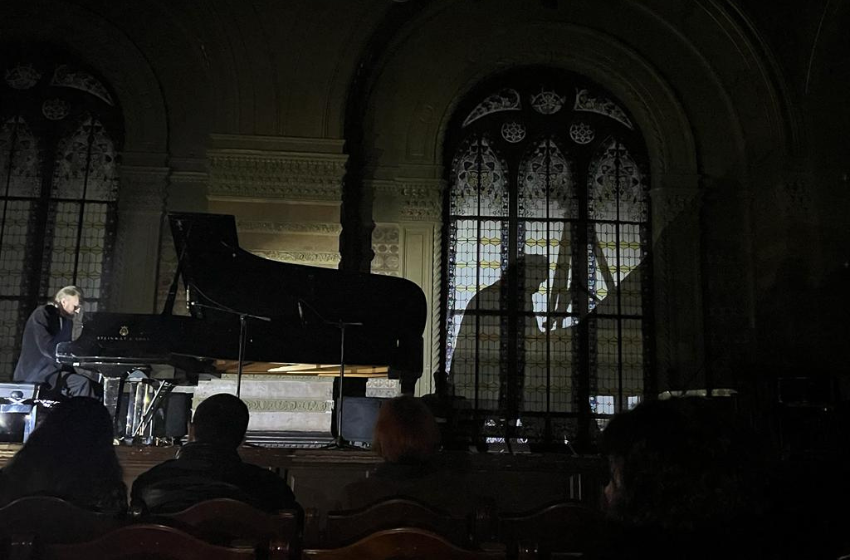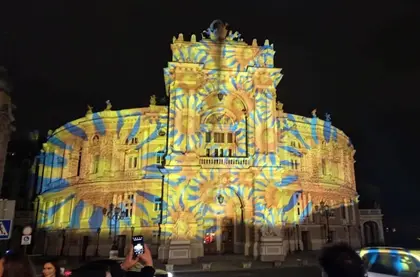On the morning of Feb. 24, 2023, Odesa’s residents expected yet another Russian missile attack to mark the anniversary of the start of the full-scale invasion. Instead, the city woke up to an eerie atmosphere of calm, set against a grey and gloomy sky.
The situation was completely different to just over a year ago when, before dawn, missiles whistled over our heads followed by an ominous bang when they hit (or potentially missed) their targets. In the distance, columns of black smoke could be seen rising above Odesa’s city rooftops.
JOIN US ON TELEGRAM
Follow our coverage of the war on the @Kyivpost_official.
No one will forget those moments when Russia launched its brutal onslaught by land, sea and air. People flocked to the supermarkets to buy essential groceries and bottles of water. They were silent, their faces blank with shock. I expected panic and screams, and instead found a disciplined calm. At the exit, with my arms laden with bags, a boy smiled at me and made a joke: "Boitsya?" (Scared?). It was the first time I had heard the use of popular Odesan irony in such a dramatic context. In the ensuing months of the war, this ironic spirit became emblematic of Ukrainian resistance.
In one year of war, the people of Odesa have transgressed fear of the arrival of Russian troops – who were halted in Mykolaiv by the courage of the Ukrainian Armed Forces and the moral strength of its citizens – and are now living with the daily threat of air raids and shelling.

Zelensky Meets CIA Director William Burns in Ukraine
In Odesa, there are not enough underground shelters for the population, and those that exist from Soviet times have not all been well maintained. Plus, there is no subway like in Kyiv. Thus, Odesa’s residents have three choices: i) take refuge in the inner rooms of one’s apartment; ii) go down to the ground floor together with neighbors (but what happens if the apartment block collapses?); or iii) ignore the alarm.
Over time, many have grown used to continuing their daily activities without giving up entirely on the warnings. Of course, as is the case across Ukraine, virtually everyone has downloaded the air alert app on their mobile phone.
And so it was that Odesa turned into a kind of Tel Aviv. The Israeli city is under constant threat of rocket attacks from Gaza, yet social life is bubbly and economic activity thrives. Foreign journalists from all over the world have been amazed by the serenity of daily life in Odesa, despite the daily tragedies told from the front and from other cities. But among friends and relatives, we talk regularly about acquaintances killed in battle and of other enlisted men whose fate is unknown. The topic of the collective effort to repel the invaders is present in every conversation.
After the withdrawal of Russian troops from Mykolaiv and the sinking of the flagship Russian cruiser the "Moskva", Odesa breathed a sigh of relief. The anti-missile defenses increased and the arrival of both military and humanitarian aid was tangible throughout the city.
In June, the Opera Theatre reopened for concerts. Prior to this opening, several musicians had already performed on the streets. This signal of vitality amongst the population sent a strong message to the invaders: “you have not frightened us, nor demoralized us.” As British wartime Prime Minister Winston Churchill once said: “If we let culture die, then what are we fighting for?”
Then, as summer turned to autumn in 2022, the season of missile attacks on Ukraine’s electricity infrastructure began. Following defeats on the battlefield, the Russian military command saw fit to carry out terrorist attacks on Ukrainian cities to shake the morale of the population.
Even in those months of blackouts and constant interruptions to light and heating, Odesa’s residents reacted with high morale and a strong degree of irony. We have all smiled at scenes of ladies using hair dryers in the supermarkets or the pop-up manicure stalls in underground car parks. The city filled itself with noisy generators that allowed restaurants, bars and other establishments to operate with minimal disruption.
But, if I had to choose an emblematic moment in Odesa one year after the war, I would choose the jazz concert by Aleksey Petukov at the Odesa Philharmonia to raise funds to support Ukraine, just two days before the anniversary of the start of the war.
In the middle of the performance, there was a blackout, so Petukov continued to play in the dark.

As if by magic, the public began to illuminate the stage and the piano with the light of their mobile phones, creating a wonderful atmosphere of defiance.
The views expressed are the author’s and not necessarily of Kyiv Post.
You can also highlight the text and press Ctrl + Enter






